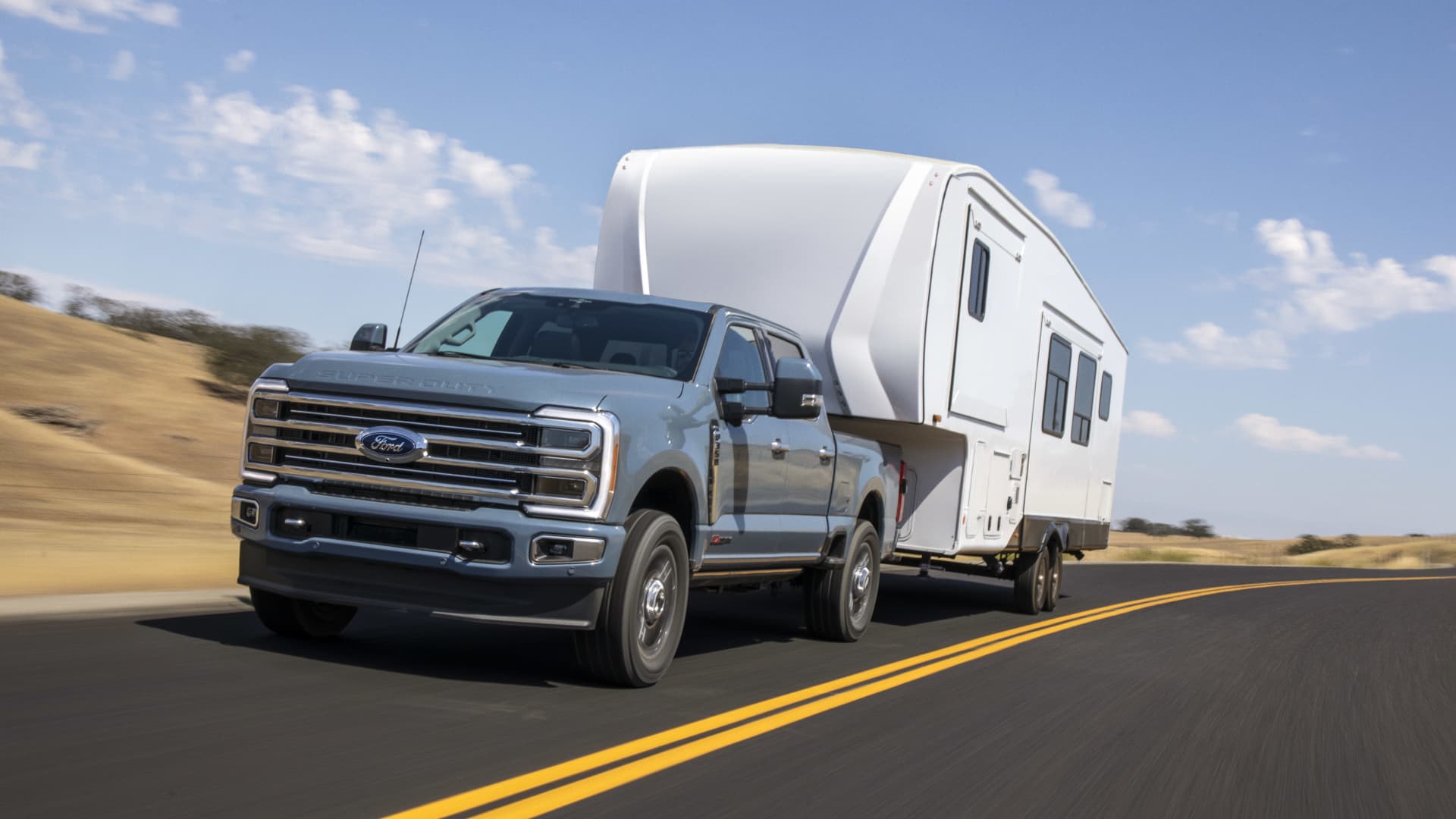DETROIT — Let’s set a scene: A pickup driver and their spouse, the truck in reverse, attempting to align the hitch ball on the pickup with a coupler on the trailer. “A little left. No, your left. No, YOUR left. OK, now a little right. Never mind. Let’s try it again.”
That familiar headache, among others, is why Ford Motor is souping up technologies on its most expensive pickups to make the vehicles more manageable for newer owners and ease major pain points for veteran truck drivers.
The Detroit automaker is adding features to its 2023 Ford Super Duty lineup to boost transaction prices of the trucks and ease difficulties with some of the vehicles’ most important functions: towing and carrying/hauling.
“This is really about making the truck safer for our customers, for equipment, for whatever you’re towing. It’s about productivity. It’s about ease. It’s about saving marriages,” said Tim Baughman, general manager of Ford’s commercial business. “With our new trailer-tow features, I’m sure we’ll be saving a couple marriages based on what it can now do.”
Many pickup owners, especially newer ones, face headaches such as determining how much weight they can safely put in their vehicles or hitching trailers to their trucks, according to Ford.
The latter challenge, specifically, can cause relationship troubles, as it can take two people and several tries to get positioning of the trucks and trailers correct for towing — like in our all-too-common but fictionalized scenario above.
“Our team is obsessed with our customers,” Baughman said. “This is about customer understanding and customer obsession. And everything in this truck is purpose-built.”
Ford says 96% of its customers tow with its F-250 to F-450 Super Duty pickups, which are larger siblings to its well-known F-150 trucks. A majority also use the vehicles to haul heavy loads in the beds of the vehicles, which start from roughly $44,000 and can run more than $103,000, depending on the model.
To assist with hitching and hauling, Ford is using technologies such as new camera features, automated assistance and smart weight taillights.
Easy hitch setup
Ford’s new “Pro Trailer Hitch Assist” takes the hassle out of the process. The truck automatically backs up and aligns the hitch ball to the trailer receiver. The feature is standard or available on several models, starting at $1,035.
“It’s to help take the pain away,” said Aaron Bresky, Ford Super Duty chief technology officer. “People have to tow for recreation and work, and the more we can take the pain out, it becomes more natural.”
The 2023 F-Series Super Duty trucks can tow between 14,000 and 40,000 pounds, depending on the truck.
Onboard light scales
Beyond towing or trailering, Ford’s Super Duty pickups can themselves haul a lot, up to 8,000 pounds, depending on the model. That includes all the people, cargo and any objects that may be in the bed of the pickup.
But having to guess or calculate how much you’re hauling can be tricky, especially when you have passengers in the vehicle or you don’t know how much your cargo weighs.
Ford’s answer to this problem is something it calls “Onboard Scales with Smart Hitch,” which debuted on the 2021 F-150. The system uses scales in the vehicle to determine the total payload/weight of the vehicle.
Drivers can use the vehicle’s infotainment screen or app to determine the payload, but Ford’s also offering a more unique way of doing so. The vehicle’s taillamps light up in different levels to let an owner know how close they are to reaching the vehicle’s total payload limit.
If the vehicle is over its certified payload, the top bar will blink, alerting the owner that they may need to rethink what they’re hauling or ditch a passenger or two.
The taillights also can be used to balance a trailer with the vehicle, also known as a trailer tongue weight.
The Onboard Scales with Smart Hitch is available for $650 on Lariat models and standard on higher-end trucks.
Tailgate camera
The simplest new feature is a rearview camera mounted to the top of the vehicle’s tailgate. While it faces toward the sky when the gate is up, it provides a clear view of what’s behind the vehicle when the tailgate is lowered, offering an extra set of eyes when an owner is hauling something longer in the bed of the vehicle.
While all new vehicles are required to have rearview cameras, Ford is the first to implement such a camera that is useful for when the tailgate is down. Standard rearview cameras on American pickups face toward the ground when the tailgate is lowered.
The option also comes with built-in sensors that work with the camera to notify drivers when their lowered tailgate is approaching an object.
The new backup camera and sensors are standard on higher-end trims but not available on entry-level and lower-priced trucks.
